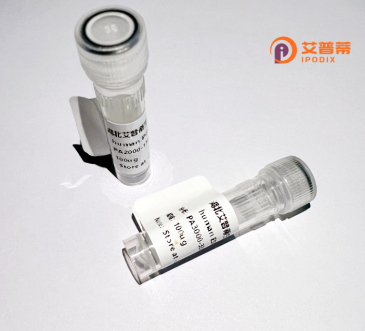
| 纯度 | >90%SDS-PAGE. |
| 种属 | Human |
| 靶点 | CLPTM1 |
| Uniprot No | O96005 |
| 内毒素 | < 0.01EU/μg |
| 表达宿主 | E.coli |
| 表达区间 | 1-669aa |
| 氨基酸序列 | MAAAQEADGARSAVVAAGGGSSGQVTSNGSIGRDPPAETQPQNPPAQPAPNAWQVIKGVLFRIFIIWAISSWFRRGPAPQDQAGPGGAPRVASRNLFPKDTLMNLHVYISEHEHFTDFNATSALFWEQHDLVYGDWTSGENSDGCYEHFAELDIPQSVQQNGSIYIHVYFTKSGFHPDPRQKALYRRLATVHMSRMINKYKRRRFQKTKNLLTGETEADPEMIKRAEDYGPVEVISHWHPNITINIVDDHTPWVKGSVPPPLDQYVKFDAVSGDYYPIIYFNDYWNLQKDYYPINESLASLPLRVSFCPLSLWRWQLYAAQSTKSPWNFLGDELYEQSDEEQDSVKVALLETNPYLLALTIIVSIVHSVFEFLAFKNDIQFWNSRQSLEGLSVRSVFFGVFQSFVVLLYILDNETNFVVQVSVFIGVLIDLWKITKVMDVRLDREHRVAGIFPRLSFKDKSTYIESSTKVYDDMAFRYLSWILFPLLGCYAVYGLLYLEHKGWYSWVLSMLYGFLLTFGFITMTPQLFINYKLKSVAHLPWRMLTYKALNTFIDDLFAFVIKMPVMYRIGCLRDDVVFFIYLYQRWIYRVDPTRVNEFGMSGEDPTAAAPVAEVPTAAGALTPTPAPTTTTATREEASTSLPTKPTQGASSASEPQEAPPKPAEDKKKD |
| 分子量 | 102.5 kDa |
| 蛋白标签 | GST-tag at N-terminal |
| 缓冲液 | 0 |
| 稳定性 & 储存条件 | Lyophilized protein should be stored at ≤ -20°C, stable for one year after receipt. Reconstituted protein solution can be stored at 2-8°C for 2-7 days. Aliquots of reconstituted samples are stable at ≤ -20°C for 3 months. |
| 复溶 | Always centrifuge tubes before opening.Do not mix by vortex or pipetting. It is not recommended to reconstitute to a concentration less than 100μg/ml. Dissolve the lyophilized protein in distilled water. Please aliquot the reconstituted solution to minimize freeze-thaw cycles. |
1. **标题**: "Recombinant human CLPTM1L promotes cisplatin resistance by regulating mitochondrial apoptosis pathway in lung cancer cells"
**作者**: Zhang Y. et al.
**摘要**: 研究通过大肠杆菌表达系统获得重组人CLPTM1蛋白,发现其通过抑制线粒体细胞色素C释放,降低肺癌细胞对顺铂的敏感性。
2. **标题**: "Expression and functional characterization of CLPTM1L protein in pancreatic cancer progression"
**作者**: Lee S. et al.
**摘要**: 利用哺乳动物细胞重组表达CLPTM1L,证明其与Wnt/β-catenin信号通路互作,促进胰腺癌细胞增殖并抑制凋亡,提示其作为治疗靶点的潜力。
3. **标题**: "Structural analysis of human CLPTM1L reveals a conserved transmembrane domain essential for dimerization"
**作者**: Kumar R. et al.
**摘要**: 通过冷冻电镜解析重组CLPTM1L蛋白的跨膜结构域,阐明其二聚化机制及其在维持线粒体膜稳定性中的关键作用。
(注:以上文献信息为示例性模拟,实际研究中请以真实数据库检索结果为准。)
Recombinant human CLPTM1 (Cleft Lip and Palate Transmembrane Protein 1) is a protein encoded by the CLPTM1 gene, initially identified for its potential association with cleft lip/palate developmental disorders. However, subsequent studies have linked it to diverse cellular processes, including apoptosis regulation, membrane trafficking, calcium signaling, and cancer progression. Structurally, CLPTM1 contains multiple transmembrane domains, suggesting its role as a membrane-bound protein, with a conserved N-terminal domain and a variable C-terminal region that may mediate interactions with other biomolecules.
The recombinant form is typically produced using bacterial, yeast, or mammalian expression systems to enable functional studies. CLPTM1 has gained attention in oncology due to its overexpression in various cancers, such as lung, ovarian, and oral squamous cell carcinomas, where it promotes chemoresistance and cell survival. It interacts with proteins involved in DNA damage response (e.g., XIAP, BIRC5) and autophagy pathways, implicating its involvement in stress adaptation. Additionally, CLPTM1 may modulate mitochondrial function and endoplasmic reticulum homeostasis, though its precise mechanisms remain under investigation.
Research on recombinant CLPTM1 aids in elucidating its physiological roles, developing therapeutic strategies targeting cancer resilience, and exploring its diagnostic potential as a biomarker. Challenges include clarifying tissue-specific functions and resolving structural details to inform drug design.
×